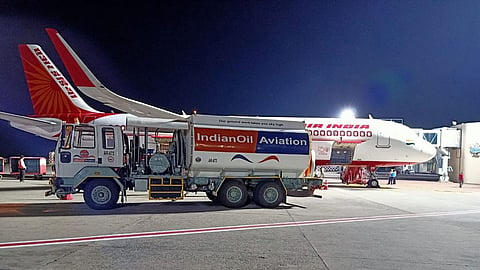The cost of aviation turbine fuel (ATF) has registered a 7.5 per cent increase – a third increase in the span of a month. Despite this hike, the cost of ATF is lower than what it was in February and the consumption too has registered an increase with the operation of repatriation flights under the Vande Bharat mission.
The 7.5 per cent hike would translate into Rs2,922.94 per kilolitre (KL). The cost of one kilolitre is Rs41,992.81, according to data released by the oil marketing companies.
The 7.5 per cent hike is the third hike in June. Rates were increased by 56.6 per cent (Rs12,126.75 per kl) on 1 June, followed by Rs5,494.5 kl (16.3 per cent increase on 16 June.
When domestic flights resumed operations on 25 May, the Directorate General of Civil Aviation (DGCA) had capped the fares till August in a bid to keep flight tickets economically viable for passengers. However, with the hike in the cost of ATF, and low passenger loads it would be a challenge for airlines to control their losses.
However, this present hike is still much lower compared to the prices that existed prior to the outbreak of Covid-19. During February, the prices in Delhi ranged between Rs60,000 and Rs65,000 per kl.
“With the partial opening of the domestic aviation sector – 33 per cent capacity at present – with repatriation flights operating under the Vande Bharat Mission for international passengers, ATF consumption has witnessed a fourfold increase from approximately 52 trillion metric tonnes (tmt) in April to 201 tmt in June,” said an official from IOCL.
However, domestic airlines are a worried lot. “When the cost of ATF was low, there was lockdown and we weren’t flying any scheduled flights. Now when the demand is barely 45 per cent there has been a hike. Survival would become a challenge if the government doesn’t support us with sops,” said a domestic airline official.
Increase in losses
India’s only profitable airline, IndiGo reported a loss of Rs870.8 crore in January-March 2020. The airline had reported a profit of Rs595.8 crore during the corresponding period of the previous year. The losses are likely to have increased for all airlines during lockdown and even now when they aren’t flying full capacity.
Aviation experts fear that as a result of losses, many domestic carriers face the risk of a closure. Meanwhile, there is something to cheer about for oil marketing companies as with un-lockdown-2 the economy is opening up as a result of which there has
been an overall increase in petroleum products consumption in India.
“India’s overall consumption of petroleum products had declined drastically during the lockdown. However, we can safely say that things are limping back to normal,” said an official from the ministry of petroleum and natural gas.
India is the world’s third largest consumer of petroleum products. With the resumption of industrial activity the total consumption has now reached 11.8 million metric tonnes – which is slightly lower than 13.4 mmt of the corresponding period of 2019.
The demand of industrial fuels such as sulphur, petcoke and naptha has reached 89.3 per cent, 118 per cent and 80.7 per cent respectively (of the demand in the same period in 2019). The demand for marine fuels (used by ships) is high at 138.5 per cent. “The crude oil throughput of oil marketing companies’ refineries has crossed 85 per cent now from the earlier low of 55 per cent in April,” said an official from IOCL.
On an industry basis, in June the petrol consumption reached 85 per cent of last year’s at 2 mmt. In June 2019 it was 2.4 mmt. With agricultural activities picking up, the consumption of diesel has increased and reached 82 per cent of the previous year at 5.5 mmt (compared to 6.7 mmt in June 2019).
So, things are limping back to normal with the opening up of the economy and one hopes that it helps create jobs or at least retain the jobs of the companies who were fearing closure!

